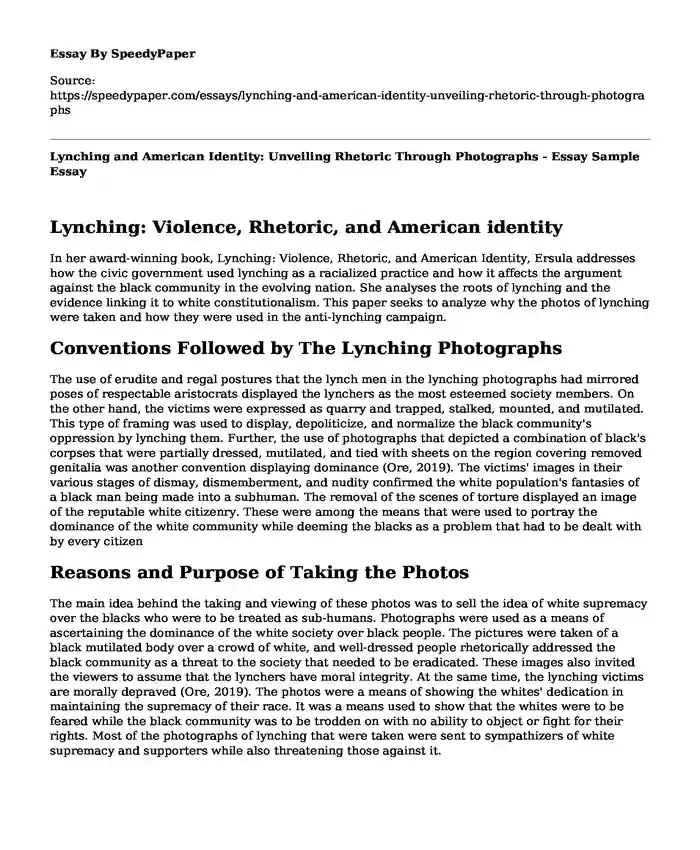
| Type of paper: | Essay |
| Categories: | Literature Books Writers |
| Pages: | 3 |
| Wordcount: | 643 words |
Lynching: Violence, Rhetoric, and American identity
In her award-winning book, Lynching: Violence, Rhetoric, and American Identity, Ersula addresses how the civic government used lynching as a racialized practice and how it affects the argument against the black community in the evolving nation. She analyses the roots of lynching and the evidence linking it to white constitutionalism. This paper seeks to analyze why the photos of lynching were taken and how they were used in the anti-lynching campaign.
Conventions Followed by The Lynching Photographs
The use of erudite and regal postures that the lynch men in the lynching photographs had mirrored poses of respectable aristocrats displayed the lynchers as the most esteemed society members. On the other hand, the victims were expressed as quarry and trapped, stalked, mounted, and mutilated. This type of framing was used to display, depoliticize, and normalize the black community's oppression by lynching them. Further, the use of photographs that depicted a combination of black's corpses that were partially dressed, mutilated, and tied with sheets on the region covering removed genitalia was another convention displaying dominance (Ore, 2019). The victims' images in their various stages of dismay, dismemberment, and nudity confirmed the white population's fantasies of a black man being made into a subhuman. The removal of the scenes of torture displayed an image of the reputable white citizenry. These were among the means that were used to portray the dominance of the white community while deeming the blacks as a problem that had to be dealt with by every citizen
Reasons and Purpose of Taking the Photos
The main idea behind the taking and viewing of these photos was to sell the idea of white supremacy over the blacks who were to be treated as sub-humans. Photographs were used as a means of ascertaining the dominance of the white society over black people. The pictures were taken of a black mutilated body over a crowd of white, and well-dressed people rhetorically addressed the black community as a threat to the society that needed to be eradicated. These images also invited the viewers to assume that the lynchers have moral integrity. At the same time, the lynching victims are morally depraved (Ore, 2019). The photos were a means of showing the whites' dedication in maintaining the supremacy of their race. It was a means used to show that the whites were to be feared while the black community was to be trodden on with no ability to object or fight for their rights. Most of the photographs of lynching that were taken were sent to sympathizers of white supremacy and supporters while also threatening those against it.
Using Imagery for The Anti-Lynching Campaign
Lynching had become a familiar spectacle, and it took various forms, including movies, news accounts, songs, illustrations, and photographs. The image vernacular of white supremacy sold wrong stereotypes of the black community, mostly the male gender. However, the images of black bodies dangling in front of proud white faces became a means for the anti-lynching protestors to contest the white imaginings visible in the nation. The protestors concentrated on the contradictions evident between Americans' professed ideals and the contradictions evident in the lynching (Ore, 2019). They recirculated the photographs as representations of the white incivility and barbarity. The use of the image of a black victim being lynched while backed with investigative reporting of the injustices that were practiced made the readers question the victims' guilt.
Conclusion
The white supremacists used lynching as a way to display dominance over the black community. The photographs taken were used to spread fear among the black community while feeding the white supremacists' egos. The anti-lynching protestors used the same imagery to spread the news of the whites' inequalities by attaching them to reports of false accusations against the blacks.
Reference
Ore, E. J. (2019). Lynching: Violence, rhetoric, and American identity. Univ. Press of Mississippi.
Cite this page
Lynching and American Identity: Unveiling Rhetoric Through Photographs - Essay Sample. (2023, Dec 27). Retrieved from https://speedypaper.com/essays/lynching-and-american-identity-unveiling-rhetoric-through-photographs
Request Removal
If you are the original author of this essay and no longer wish to have it published on the SpeedyPaper website, please click below to request its removal:
- Cultural Artifact Essay Example
- My Autobiography Essay Sample
- Compare and Contrast Essay Sample: Paul Marie Verlaine and William Butler Yeasts and Their Works
- Incidents in the Life of a Slave Girl - Literary Essay Example
- Does the Odyssey Celebrate Cultural Diversity, or Does It Foreclose? Essay Sample
- Free Essay. Comparison Between the Approaches of the Photorealists to That of Pop Artists
- Free Essay on Global Warming: Annotated Bibliography
Popular categories




